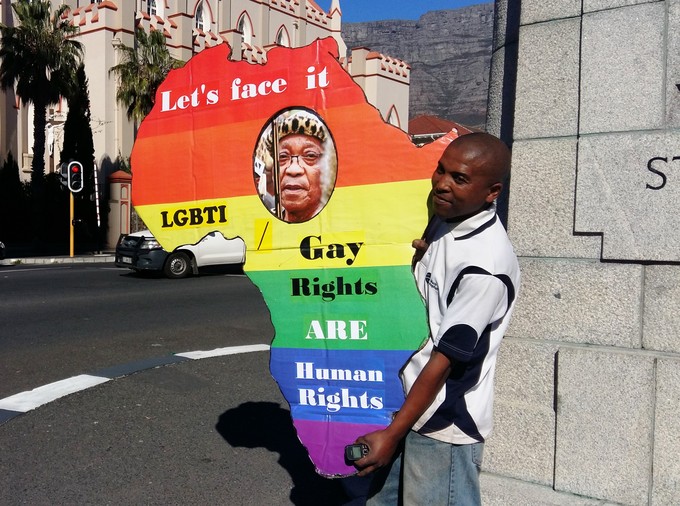
“I want gay people to understand that not all of us are against them,” Gcimikhaya Mamtame says as he poses with the “Let’s Face It” cut-out. Photo: Kayla Molander
7 July 2016
Supporters of Scalabrini Centre’s “Let’s Face It” campaign demonstrated outside the Cape Town Houses of Parliament today. The action was prompted by South Africa’s decision to abstain from voting on a resolution to protect LGBTI rights in the United Nations Human Rights Council in Geneva last week.
The activists carried a rainbow cut-out of Africa with the words: ‘Let’s Face It - LGBTI Rights ARE Human Rights’. People were encouraged to pose for pictures with the cut-out to show their support for gay rights. Ruvimbo Tenga from Scalabrini roped people in with a smile and friendly conversation, while her colleague, Neil Goodwin, explained about the campaign and took pictures of them.
Today, the cut-out was filled with a photo of President Jacob Zuma’s face. Goodwin explained it was because of the vote in Geneva. He said that South Africa was the first country in Africa to legalise gay marriage.
“[The vote in Geneva] shows South Africa as being neutral on LGBTI rights, rather than a leader in the debate,” he said.
Joe le Grange, who was passing by, posed with the cut-out, and commented on the UN vote. “I’m disappointed because I was under the impression that we had the most progressive democracy in the world. That’s what we’ve been projecting … Traditionalism is coming back. It’s harsh for people of different sexual orientations.”
The goal of the campaign is to get 1,000 people to pose with the cut-out. The pictures will be used in a film about gay rights. Since the campaign kicked-off in March, 780 people have been photographed, including John Jeffery, Deputy Minister of Justice and Constitutional Development. By the end of today’s demonstration, the campaigners hope to have 800 pictures. They are saving the 1000th picture for Desmond Tutu.
Not all the responses to the campaign have been positive. Goodwin says many people have said being gay is a Western concept and has no place in Africa.
“We want to show that homophobia is the result of colonialism, not homosexuality,” he said. The back of the cut-out shows a history of homosexuality in Africa before European colonisation.
Gcimikhaya Mamtame, who also happened to be passing, said he was proudly supportive of gay rights. “This is one thing that affects all of us… Each and every family has a gay person, and sometimes they hide it because they’re scared of their families. Families need to understand that this is a way of life.”